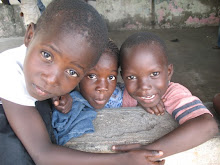
A stressful week for the Theatre for a Change staff: Johnson in particular has been working incredibly long hours as he works with budgets, end of the month accounting, projects with teachers and young people and the development of a funding proposal for a big new project in Somanya and Accra.
Angela Russ, a former Concern Country Director in Ghana, has been working with the team for the last few weeks, helping prepare the application for the new project looking at gender, HIV/AIDS and the rights of young people.
A large part of Angela’s research so far has focussed on access to education, particularly for girls and young women. On Monday we spent a large part of the day planning the new project. We talk a lot about education: about the value that families put their children’s schooling, how school is now free for all students (but you still have to buy your desk, your chair, your books before you’re allowed in), how boys are still more likely to go to school – and how girls are more likely to drop out.
Dropping out of education – which means a loss of future employment possibilities, of self-esteem, of access to healthcare advice – means young people are also at a higher risk of contracting HIV. Some girls might take up with ‘sugar-daddies’ (a theme echoed in many of the performances devised at the James Town Community Theatre), some might become prostitutes.
Also significant is a lack of stigma associated with underage sex. ‘Puberty Rites’ traditionally take place for girls around the age of 18 and mark the passage of a girl into a sexually mature adult – able to marry and have sex. Increasingly, and particularly in poor communities, puberty rites are taking place at younger and younger ages. This can be because it’s cheaper to have the rites performed for all the daughters in a family at once. In other cases parents consider it ‘safer’ to have the rites performed earlier: in some communities a teenage girl who gets pregnant before the rites have taken place is liable to be ostracised from her community, so it’s better to do it earlier ‘just in case’. The effect of this, of course, is to legitimise underage sex and so make the chance of unwanted teenage pregnancy – and of HIV transmission – all the greater.
As part of the research for the funding proposal Amanor and I spend a lot of Wednesday at various ministries, trying to find obscure departments with at least five names, digging around for information on enrolment numbers, visiting the Domestic Violence unit of the local police for figures on crime against children.
Later on I go to interview three chiefs – heads of the ‘villages’ which make up parts of James Town. Of course, things never turn out quite as you expect – I end up meeting one chief and one chief’s wife at their house in the middle of James Town. The wife scolds me for not bringing money and schnapps (as is the custom when meeting a chief, but I’ve been told it’ll be ok not to) and for not visiting his elders first – which is the respectful thing to do.
The chief, resplendent in small white shorts, is not impressed and doesn’t answer any of my questions; his wife talks for ages about James Town and how it needs help from ‘outside’, about her time in London in the 1990s and about how she’ll help us set up a proper chief's meeting – with schnapps and elders and, hopefully, some answers to my flimsy little sheet of questions.



No comments:
Post a Comment